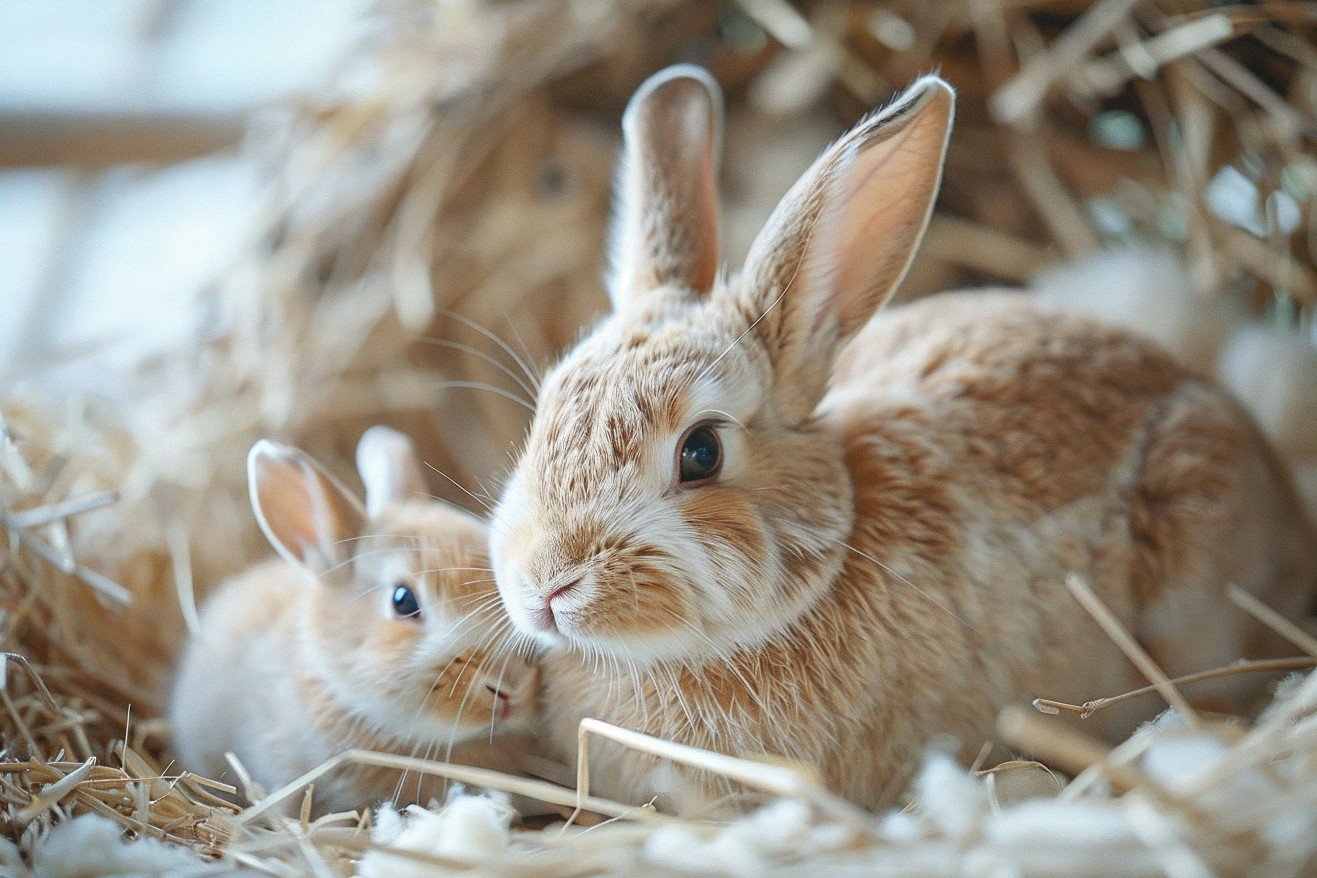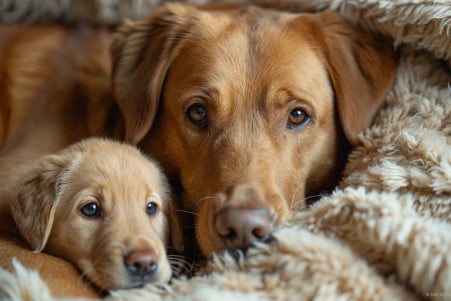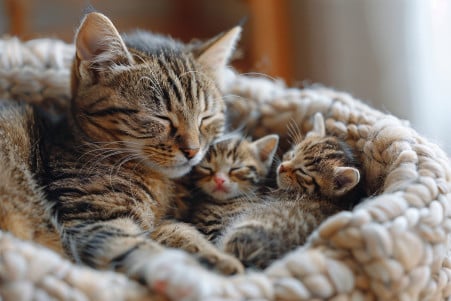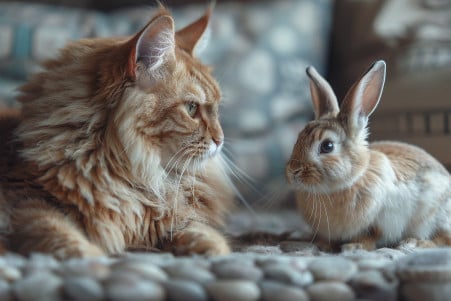Why Do Rabbits Eat Their Babies? Understanding Maternal Behavior in Rabbits
7 March 2024 • Updated 7 March 2024

The phenomenon of rabbits eating their young is one of the most disturbing mysteries of the animal kingdom. Stress, nutritional deficiencies, and postpartum confusion are all factors that may contribute to rabbits eating their babies. However, this highly unusual behavior can often be avoided by creating a stress-free environment, ensuring proper nutrition, and removing any stillborn kits before they can trigger this reaction.
In this investigation of this disturbing behavior, we will look at interdisciplinary research from ethology, veterinary science, and animal psychology. We will also explore research that has looked at the environmental, nutritional, and psychological factors that may contribute to this extreme maternal behavior in rabbits. This in-depth review is intended to offer a more complete picture of the complex biological and environmental factors that impact rabbit behavior.
Why do rabbits eat their babies?
Understanding the Causes of Maternal Infanticide in Rabbits
Environmental stressors have a major impact on mother rabbits that commit infanticide. Stressors like being kept in a small cage or feeling threatened by predators can cause rabbits to experience extreme stress, which can lead to infanticide. A study in PMC found that stress-induced hormonal changes, especially in cortisol, can alter normal maternal behaviors, including nest building, which is important for the survival of offspring.
Nutritional deficiencies, especially a lack of protein, can also lead to this behavior. Rabbit Care Tips explains that it’s important to feed rabbits a diet that includes Alfalfa hay before and after giving birth to avoid the nutritional deficiencies that can lead to infanticide.
In addition, mothers who are first-time parents or who have experienced the trauma of a stillbirth may be at risk because they may accidentally eat their young while eating the placenta because they are confused or stressed.
In addition, the amount of human contact a rabbit has, or doesn’t have, can impact maternal behaviors. Making sure that pregnant and nursing rabbits have a calm environment and a consistent schedule, as Rabbits Smarties points out, can help reduce stress and, in turn, the likelihood of maternal infanticide.
It’s important to make sure that mother rabbits have a safe, calm space that is free from loud noises and other disruptions so that they can provide healthy maternal care.
Rabbit Maternal Behavior
Maternal rabbits display a range of behaviors that are both interesting and important as a model for mammalian care. A study in PubMed explains that rabbit mothers display a highly organized set of behaviors that includes a three-phase nest-building process and a single, short nursing session each day.
Hormonal changes during pregnancy and lactation are key; González-Mariscal explains how estradiol, progesterone, and prolactin levels change to control nest-building behaviors and prepare the maternal brain to respond to the needs of the newborns.
The relationship between the mother and her kits is important, and disruptions in the bonding process can impact the mother’s care of her babies. Sibling relationships within the huddle are also important, impacting the kits’ physical warmth, as well as their neuromotor and social development.
A study in the Applied Sciences by Agnes Bilk emphasizes the importance of the nest’s content, which the mother carefully selects to create the right environment for her babies to thrive.
By understanding these natural behaviors and the balance they create, we can understand the complexity of rabbit maternal care and the things that can disrupt that balance, leading to stress responses that are unusual for these caring animals.
Stress-Induced Changes in Rabbit Behavior
Cortisol, the primary stress hormone in rabbits, has been shown to have a major impact on rabbit behavior. A study published in PubMed by Aloyo found that placing rabbits in a novel environment increases their stress hormone levels and results in behavioral changes, such as increased head-bobbing.
While this change in behavior is not directly related to the infanticide, it could be a result of the stress that leads to the extreme behavior. This study shows that a stress response can lead to a change in behavior and emphasizes the need for a stable environment to maintain normal rabbit behaviors.
Other research has shown that environmental changes, especially heat, have a big impact on rabbit welfare. A study published in PMC explains that heat stress causes rabbits to undergo systemic physiological changes that affect their immune system, endocrine system, and, in the end, their reproductive performance. These changes can also lead to changes in maternal behavior, which may be a factor in the few cases of infanticide that have been observed.
In addition, parasitic infections are a major cause of stress in rabbits. A study published in Parasites & Vectors found that rabbits infected with Psoroptes cuniculi experienced hormonal changes and changes in behavior, including a decrease in locomotor activity and exploratory behavior, which can lead to stress in mother rabbits.
By looking at the different stressors that impact rabbit behavior, we can start to see how complex their relationship with the environment is—something that is important to understand when it comes to understanding the evolutionary pressures that have shaped rabbit maternal instincts and behaviors.
Evolutionary Perspectives on Maternal Infanticide
While the idea of maternal infanticide in the animal kingdom may seem strange, there are several evolutionary reasons it may occur. For example, in some mammalian species, including rabbits, females may commit infanticide to increase their reproductive success by reducing competition for resources, according to the Philosophical Transactions of the Royal Society B.
These resources can include things like food, shelter, and even social rank within a community, all of which can impact the survival and future reproductive success of the mother’s offspring.
In many species, as described by the Max-Planck-Gesellschaft, maternal infanticide can be a response to high levels of intrasexual competition, and the behavior can actually increase the fitness of the mother.
Maternal infanticide is not just a form of direct aggression, but rather a complex competitive strategy that has deep evolutionary roots. As noted in Nature Communications, this can mean that infanticide strategies, especially when they are rare in populations, can be advantageous by potentially ensuring better access to limited resources in harsh environments.
This perspective can help researchers look at the rare cases of maternal infanticide in rabbits without sensationalizing the behavior. Instead, it can help them understand a larger biological and evolutionary context that can ultimately lead to better breeding strategies and environmental interventions that can help ensure the well-being of rabbit populations.
Protecting the Nest: How to Stop Maternal Infanticide in Rabbits
To stop the disturbing cycle of maternal infanticide in rabbits, both breeders and pet owners need to focus on keeping the environment as stress-free as possible. According to a study in PMC, this means that it is especially important to reduce stressors around the time of birth, as stress can disrupt the important maternal behaviors like nest-building.
This means that it’s important to make sure that the mother rabbit has a safe, quiet place to care for her babies.
Nutrition is also key. Rabbit Care Tips suggests that a diet high in Alfalfa hay before and after birth can help to avoid protein deficiencies that can lead to maternal infanticide. This kind of nutritional planning can help to keep the doe healthy during the stressful time of lactation.
Breeders and pet owners also need to be watchful after the birth so that they can intervene if necessary. Breeders and pet owners should remove any dead kits as soon as possible to avoid the mother rabbit from engaging in behaviors like infanticide that are caused by her natural instinct to clean the nest.
Breeders and pet owners should also be sure to handle the kits carefully. While it is a myth that the scent of humans will cause a mother rabbit to reject her babies, rough handling can cause the mother to become stressed. Handling the kits gently will ensure that they are healthy without causing the mother undue stress, which can help to create a nurturing environment for the babies.
Understanding and Preventing Maternal Infanticide in Rabbits: In Conclusion
In the complex world of rabbit maternal behavior, maternal infanticide, while disturbing, is extremely rare and often caused by stress, confusion, or malnutrition. Rabbit Care Tips and Rabbit Smarties have both discussed studies that emphasize the importance of a stress-free environment, proper nutrition, and good care in preventing this unfortunate behavior.
Meanwhile, a study on PMC has shown the importance of hormones like cortisol and progesterone in maternal nesting behaviors and offspring survival, further demonstrating the importance of a stress-free birth.
When looking at the causes and prevention of this behavior, it’s evident that stress is a major factor that can be controlled to prevent maternal infanticide. Proper rabbit care, based on research from a variety of fields, can help make sure that both mother rabbits and their babies are safe.
By recognizing the role of caretakers in creating a safe environment for these delicate animals, we respect the nuances of animal behavior and further our dedication to animal welfare.


